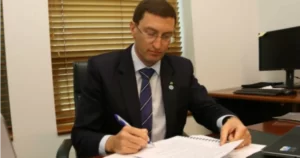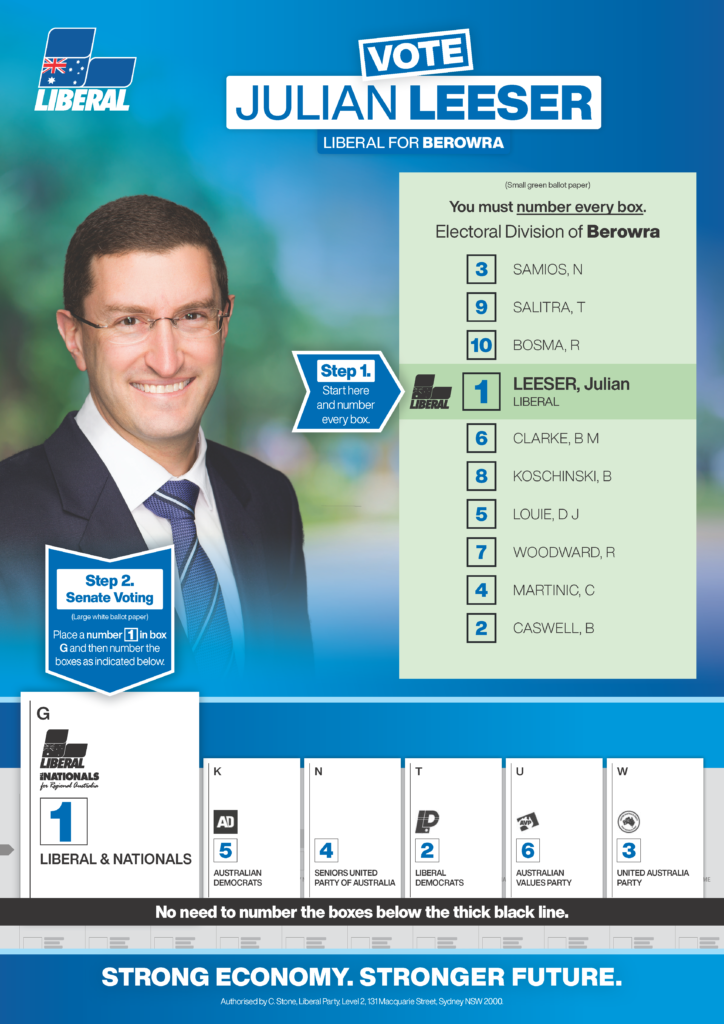St Stephen’s Uniting Church
24 October 2023
I acknowledge the Gadigal people and pay my respects to Elders past, present and emerging.
I am honoured and humbled to receive this award from Uniting NSW ACT.
It is a particular honour to be the first recipient of this award. As a Jewish Australian, I want to acknowledge my friendship with the Christian churches in Australia who contribute so much to the spiritual and material welfare of Australians.
I was educated by Anglicans and before I became an MP I worked for the largest mission of the Catholic Church.
In particular, I want to acknowledge the positive influence the Uniting Church has had on my own life.
For the last five years I have had the privilege of working with Annette McHugh.
She has been a wonderful advisor and friend. Her own faith formation influenced the character of the leadership she brought to my team and her view of public policy. This was not a surprise as her late father Rev Dr Peter Pereira was a proud son of this Church and a former Director of Mission for Uniting Care. In that role he was successor to Rev Harry Herbert.
In accepting this award, which is for a virtue, I am reminded a little of the old story of the church that presented one of its congregants with a medal for their humility, then promptly took the medal off the recipient after they started wearing it.
It is right that we are reflecting on the referendum with the Uniting Church. You played an important role in my experience of the campaign. In that sense you carried on a tradition of the Churches in promoting conversations about the Constitution going back to the Federation debates of the 1890s.
One of the first local events I did supporting the Voice was at Thornleigh Uniting Church.
It is the Church of my friend and your former Moderator Jim Mein’s. A wonderful local community – young and old.
And one of the last events in the campaign was a gathering at Epping Uniting Church just outside my electorate.
It was a bi-partisan event, and one of those lovely events when after the formalities are over, you stay and linger with a cup of tea and a milk arrowroot biscuit and chat.
At both events, I was joined by Brook Prentice who is a wonderful Indigenous Christian leader who spoke so meaningfully about the church and Indigenous Australians. And at Thornleigh I appeared on a panel with Nathan Tyson, your Director, First People’s Strategy and Engagement.
And of course, it was also wonderful to be at the launch of Uniting’s Yes campaign at Ashfield Uniting Church with Bill Crews. Bill, of course, has given new meaning to the miracle of the loaves and fishes – having fed people every day for almost 40 years.
At all of these events, I was reminded by the wonderful words of the Late Rabbi Jonathan Sacks who once said “a community is a place where people know your name and miss you when you are not there.”
And that’s what you do. Uniting builds communities.
I want to thank Uniting for making communities right across the country.
I have to confess, in accepting this award, I feel many conflicting emotions.
The first is my gratitude – but it is tempered by my feelings for Indigenous Australians who are feeling bruised at this time.
We need to be mindful of that.
I repeat what I said on referendum night: We need each other. We belong to each other. We share this land – and we must walk together so that we can close the gaps between us.
The late Rev Peter Marshall, Chaplain to the US Senate once said “It is better to fail in a cause that will ultimately succeed, than to succeed in a cause that will ultimately fail”.
I believe the cause of reconciliation is a cause that will ultimately succeed.
It will be different than what we imagined 10 days ago, but it will succeed.
And it will, and must, because of the necessity of closing the gap – because the education, health, safety, and housing gaps that exist, should not exist in a county as wealthy and prosperous as Australia.
I have reflected a little on the ideal you are honouring today.
Courage.
I believe the foundation of courage is conviction.
The willingness to stand for what you believe.
I like to think I do that every day – as do most of those in the parliament across the political spectrum.
Mostly, our convictions run with the political party or grouping we belong to.
For me that’s the Liberal Party, and mostly I hold orthodox liberal and conservative views.
I believe in the Crown. I believe in institutions. I believe in the Constitution as the mediator of power in this country.
I believe in the rights and freedoms of individuals, including their right to follow their own faith, if they have a faith, and choose their own path.
I understand the limitations of government best expressed through lower taxes, and that we grow economies through opportunity and incentive.
I believe in liberal democratic ideals and the ballot box as the arbiter of our differences.
My point is that public life is an invitation to act courageously by advocating for our convictions.
One of the points I made on referendum night was to acknowledge the skill, strength and courage of Indigenous leaders – who advocated both for and against the Voice.
And I want to speak their names here – because collectively they brought Indigenous leadership to the fore in our country over recent months.
I acknowledge YES leaders such as Linda Burney, Noel Pearson, Malarndirri McCarthy, Dean Parkin, Pat Dodson, Ken Wyatt, Karen Mundine, Marcia Langton and Rachel Perkins, as well as the NO case leaders, Jacinta Nampijinpa Price, Kerrynne Liddle and Warren Mundine.
I am in awe of their shared leadership.
Together, they give me hope.
Though many of them are hurting, I say our country needs their leadership, yes, it needs your voices as it needs the voices of Indigenous Christian leaders too.
Friends, in accepting this award, I want to say a few words that you might not expect about my political tradition.
Tonight, I want to acknowledge and praise one of the essential tenets of the Liberal Party – and that might seem an unusual thing to say for someone receiving an award for his YES case advocacy, when his party was supporting the No case.
But that is exactly my point.
My party, the Liberal Party allows its backbenchers the freedom to go against a party position.
In the other parties, I’d be expelled for acting on my convictions.
Yes, along with Bridget Archer and Andrew Bragg, we were the only parliamentarians in the federal parliament to advocate for a view different to our party.
But that is to the Liberal Party’s credit.
We are allowed to disagree, to challenge and to engage with a different view.
My call to the Labor Party is to forsake the binding pledge you force your members to sign. It is an antiquated relic of the past.
And to the Greens it is to formalise the right of conscience rather than the current rigid demand for ideological compliance.
It is time to give your members and senators the same freedom – because conscience matters and change only occurs when the status quo is challenged.
One of the lessons of this past year is that we need more persuasion, negotiation, compromise and common ground in this country.
As I said earlier in the year, the problem with an all or nothing approach is sometimes you end up with nothing.
All of us in public life have to work harder in finding common ground – to engage in the messiness of interacting with others outside our political tribe and tradition.
It was Gough Whitlam, the brother of a former moderator of this church Frida Whitlam, who made an unusual observation about politics and about what and how we advocate for change.
He said “only the impotent are pure”.
A very Whitlamesque quote.
One that I must apologise for saying in a church.
But his point is, there are always trade-offs, as we seek to deliver change.
The perfect should not be the enemy of the good.
That means that political life is not only about courage and conviction, but compromise and negotiation.
It is about engaging with messiness – and mostly, that doesn’t look like courage – but it is.
It takes courage to listen and engage with difference.
I said many times during the referendum campaign that I had been taking solace reading about the work of the framers of our Constitution in the 1890s.
One of my takeaways from that reading is that none of the framers got everything they wanted during the federation debates and votes.
Our great federation was the result of compromise and finding common ground.
And in this context, it means that even in our disappointment over the referendum result, we must keep engaging.
We must stay on the path of reconciliation.
None of us must walk away.
We must show courage, and equally we must listen as well.
This process is messy.
But we must focus on our work, on our service, and on the country – and the generations to follow.
Over a century ago, US President Teddy Roosevelt described what that work is like. He said:
“It is not the critic who counts; not the man who points out how the strong man stumbles, or where the doer of deeds could have done them better. The credit belongs to the man who is actually in the arena, whose face is marred by dust and sweat and blood; who strives valiantly; who errs, who comes short again and again, because there is no effort without error and shortcoming; but who does actually strive to do the deeds; who knows great enthusiasms, the great devotions; who spends himself in a worthy cause; who at the best knows in the end the triumph of high achievement, and who at the worst, if he fails, at least fails while daring greatly, so that his place shall never be with those cold and timid souls who neither know victory nor defeat.”
I have not been alone on this journey over this past – there were tens of thousands of others who supported the YES campaign.
To all of those who feel as if their faces are marred by dust and sweat and blood, I say stay engaged. Continue in the work of making our country a better place.
We must continue on the path of reconciliation – because we need each other. We belong to each other. And we share this land.
That is what must guide us on the road ahead.
ENDS




